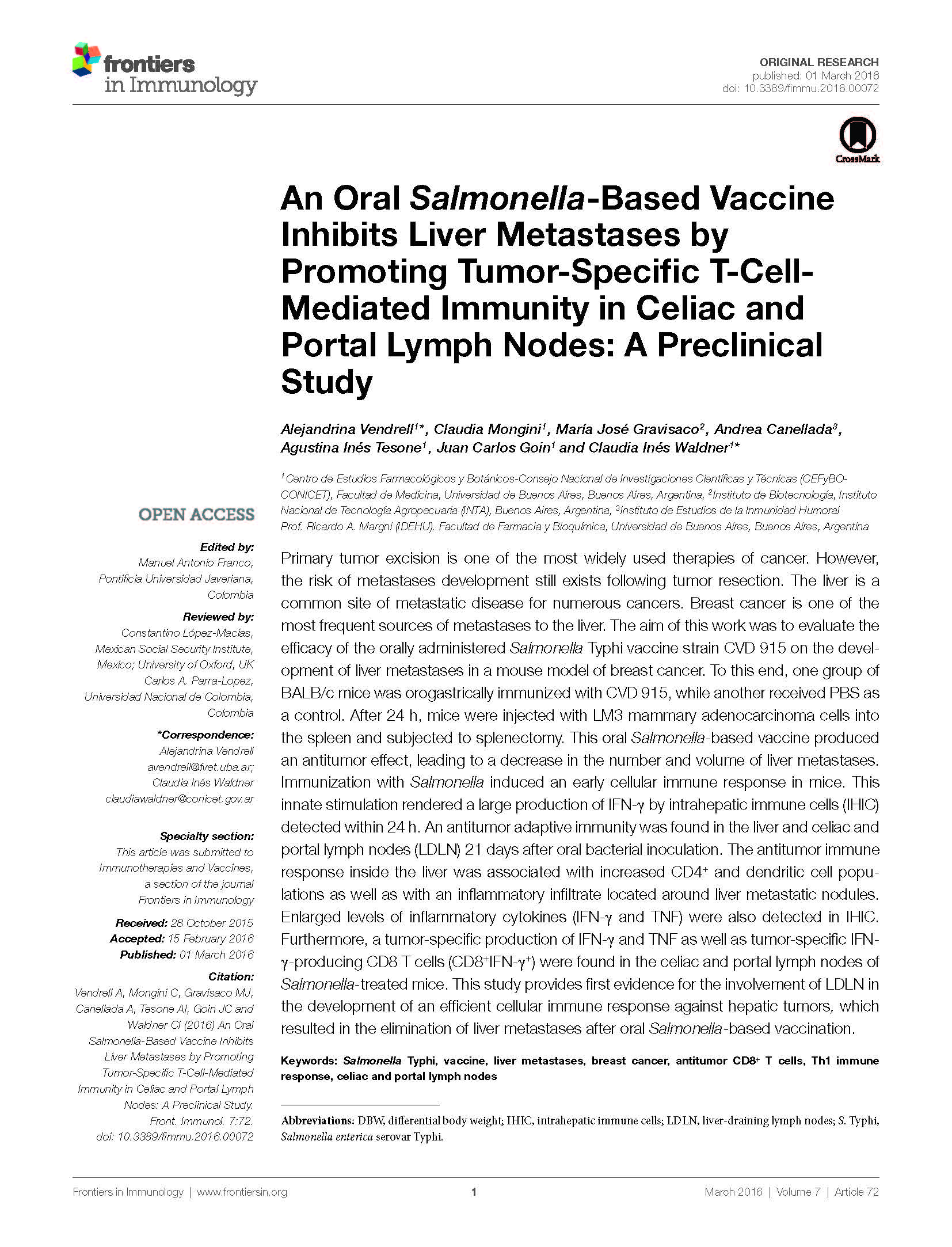Ver ítem
- xmlui.general.dspace_homeCentros e Institutos de InvestigaciónCICVyA. Centro de Investigación en Ciencias Veterinarias y AgronómicasInstituto de BiotecnologíaArtículos científicosxmlui.ArtifactBrowser.ItemViewer.trail
- Inicio
- Centros e Institutos de Investigación
- CICVyA. Centro de Investigación en Ciencias Veterinarias y Agronómicas
- Instituto de Biotecnología
- Artículos científicos
- Ver ítem
An oral salmonella-based vaccine inhibits liver metastases by promoting tumor-specific T-cell-mediated immunity in celiac and portal lymph nodes : a preclinical study
Resumen
Primary tumor excision is one of the most widely used therapies of cancer. However, the risk of metastases development still exists following tumor resection. The liver is a common site of metastatic disease for numerous cancers. Breast cancer is one of the most frequent sources of metastases to the liver. The aim of this work was to evaluate the efficacy of the orally administered Salmonella Typhi vaccine strain CVD 915 on the development of liver
[ver mas...]
Primary tumor excision is one of the most widely used therapies of cancer. However, the risk of metastases development still exists following tumor resection. The liver is a common site of metastatic disease for numerous cancers. Breast cancer is one of the most frequent sources of metastases to the liver. The aim of this work was to evaluate the efficacy of the orally administered Salmonella Typhi vaccine strain CVD 915 on the development of liver metastases in a mouse model of breast cancer. To this end, one group of
BALB/c mice was orogastrically immunized with CVD 915, while another received PBS as a control. After 24 h, mice were injected with LM3 mammary adenocarcinoma cells into the spleen and subjected to splenectomy. This oral Salmonella-based vaccine produced an antitumor effect, leading to a decrease in the number and volume of liver metastases.
Immunization with Salmonella induced an early cellular immune response in mice. This innate stimulation rendered a large production of IFN-γ by intrahepatic immune cells (IHIC) detected within 24 h. An antitumor adaptive immunity was found in the liver and celiac and portal lymph nodes (LDLN) 21 days after oral bacterial inoculation. The antitumor immune response inside the liver was associated with increased CD4+ and dendritic cell populations as well as with an inflammatory infiltrate located around liver metastatic nodules.
Enlarged levels of inflammatory cytokines (IFN-γ and TNF) were also detected in IHIC.
Furthermore, a tumor-specific production of IFN-γ and TNF as well as tumor-specific IFN- γ-producing CD8 T cells (CD8+IFN-γ+) were found in the celiac and portal lymph nodes of Salmonella-treated mice. This study provides first evidence for the involvement of LDLN in the development of an efficient cellular immune response against hepatic tumors, which resulted in the elimination of liver metastases after oral Salmonella-based vaccination.
[Cerrar]

Autor
Vendrell, Alejandrina;
Mongini, Claudia;
Gravisaco, María José;
Canellada, Andrea;
Tesone, Agustina Inés;
Goin, Juan Carlos;
Waldner, Claudia Inés;
Fuente
Frontiers in immunology. (01 March 2016)
Fecha
2016
ISSN
1664-3224
Formato
pdf
Tipo de documento
article
Palabras Claves
Derechos de acceso
Abierto
 Excepto donde se diga explicitamente, este item se publica bajo la siguiente descripción: Creative Commons Attribution-NonCommercial-ShareAlike 2.5 Unported (CC BY-NC-SA 2.5)
Excepto donde se diga explicitamente, este item se publica bajo la siguiente descripción: Creative Commons Attribution-NonCommercial-ShareAlike 2.5 Unported (CC BY-NC-SA 2.5)


